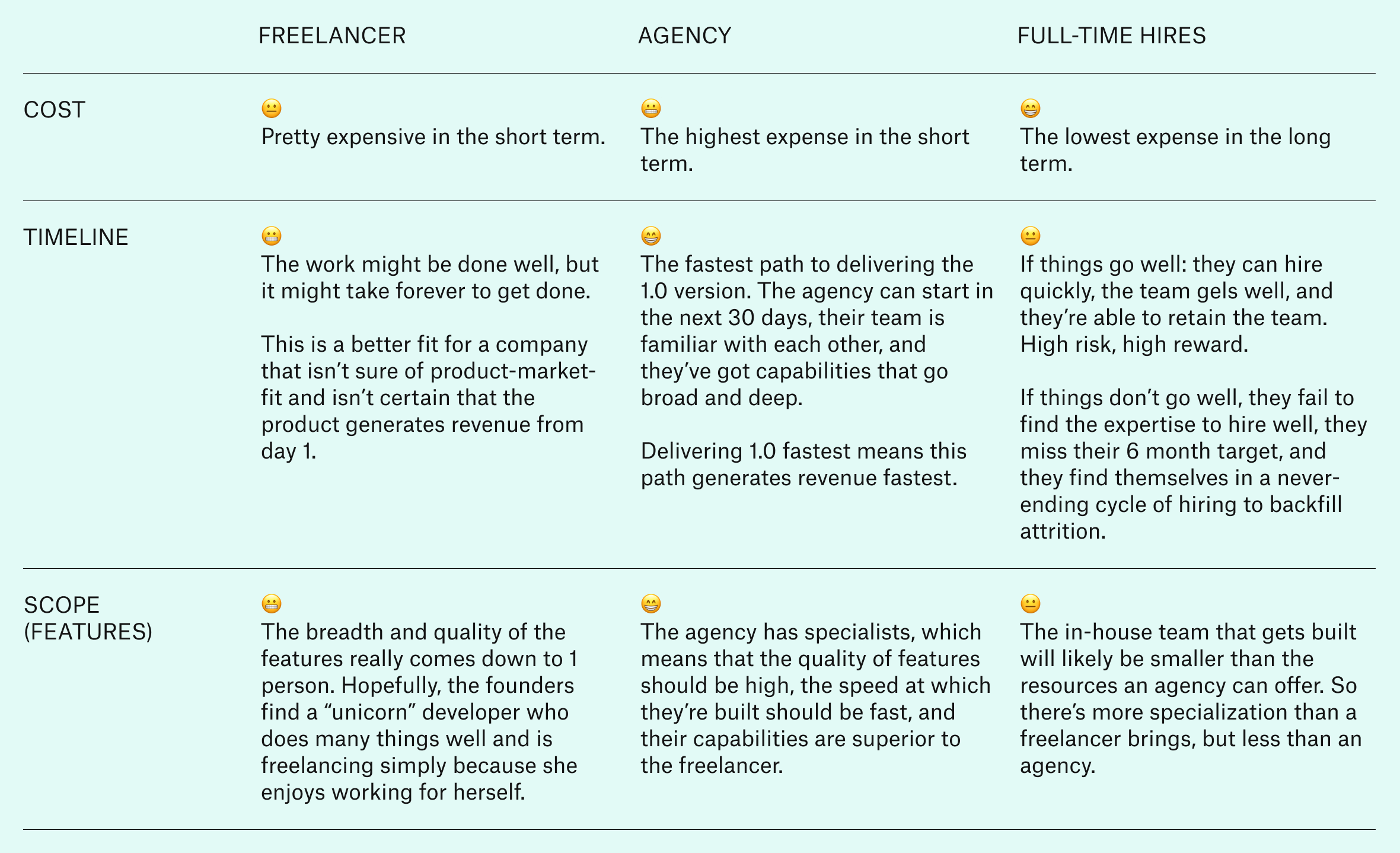When To Agency.
When does it make sense to hire a software development agency? To hire full-time employees? To contract a freelancer? A look at 3 hiring options for a startup that needs software developers.
For illustration purposes*, let’s imagine this start-up is building a platform designed for smoothie cafes to handle customer orders and inventory management 🍌🍓🫐.
Our founders are deeply familiar with the smoothie industry and are confident they’ll find product market fit once they have a Minimum Viable Product (MVP or “version 1.0”) to show the cafes. They’ve raised money from the successful sale of prior smoothie businesses, from friends and family, and from some seed investors.

What’s the existing team look like? So far let’s say they’ve hired a product strategist who has successfully delivered MVPs in the past. She’s saying they should be able to have a 1.0 version ready in 6 months with the right development team. They’ve already got a design agency hired and working with the product strategist to conduct user research and draft user stories for the 1.0 version.
Now it’s time to bring on the developers to work alongside the team.
Hiring Options
THE FREELANCER
They’ve got a few referrals for great freelance software developers out there. They’re looking to work with someone who is based in the U.S., because it will simplify communications and they have no idea how to navigate the international contracting market. For better or worse, it feels safer.
They’ve emailed with 3 freelancers and have hourly costs ranging from $75 to $150 per hour.
All of the freelancers have been really communicative and feel like they’d be easy to work with.
But the founders have no idea how to evaluate the quality of the freelancers’ work. All they have to go off is the portfolios on their websites, and even then, they can’t judge how well the applications actually work. They’ll be able to chat with references, but the quality of the work is going to be a real mystery.
Their instinct is to play it safe and pony up for the most expensive freelancer. If they’re the most expensive, that must mean their work justifies the price – right? Right?
But even if they do pick the right freelancer, timeline is going to be a problem. They want to get the 1.0 version of the platform in the hands of customers in 6 months so that it can start generating revenue. A one-person development team could take 2x as long as a pair of developers. And what happens if the freelancer goes on vacation or can’t work for one reason or another? Or what if they get a job offer that’s too good to pass up mid-way through the project? All of their eggs will be in one basket.
THE AGENCY
The founders do a Google search for “software development agency.” They’re overwhelmed with results. All of these companies seem obsessed with “launching” things. Illustrations of rockets abound. Every agency has an office “mascot” that is just a dog. None of these people even look like nerds.
After a few hours of sifting through search results and a website called Clutch, the founders reach out to 4 agencies that look to have good reviews and a brand that feels right.
The quotes come in: $125 per hour, $175 per hour, $185 per hour, and $225 per hour.
Most of the prices are higher than what a freelancer would be. Some of them are in the neighborhood of their lawyer who bills in 15 minute increments. They’ll need 6-plus months of support from this agency!
But two of these agencies really seem to know what they’re doing. It seems like they launch similar projects multiple times a year with team members who have already worked on many projects together. They’re able to scale the team size up or down depending on the phase of the project. They have a team of people not just in software development, but also in design and project management. Our founders hadn’t even considered project management, which sounds both like an inviting security blanket in an uncertain future and also like a needless expense.
They receive polished PDF proposals that sow seeds of doubt in their freelancer explorations. They worry there’s a lot of unknowns that the freelancers are overlooking and that the agencies can solve when the going gets tough.
THE FULL-TIME TEAM
It’s impossible for the founders to not consider: what if we just built our own in-house development team? We’ll need to do it eventually, and it will be a fraction of what we’d need to pay an agency.
But what would the job posting say? Neither of our founders understand what programming languages, skills, or experience their software developers would need to build their vision. Their product strategist could probably fill in some of the blanks, but hiring feels like the riskiest path. Kind of like heading into a courtroom without a lawyer and fooling yourself into thinking “I’ll just represent myself.”
Even if they hire a consultant to help them build out their team, hiring could take months. And then what happens when a developer quits? Don’t these Millennials switch jobs every 9 months? They might be better off just hiring the really expensive (good?) freelancer and planning for the project to take 12 months instead of their target 6. But what about the opportunity cost of not generating revenue as early as possible…
Finally, what happens to this team after the 1.0 version is released? If the large technical milestones are completed and occasional maintenance work is all that’s needed, they can’t justify paying $450k in developer salaries each year (2 Software Engineers at $123,000 (source) + 1 Software Engineering Lead/Manager at $205,000 (source)). Will they just need to lay off the team?
The founders are at an impasse.
Making the decision
The path the founders take in hiring should come down to their business strategy.
We don’t need to do a full SWOT analysis, but let’s review where the founders have more risk and where they have less risk (more confidence):
Areas of confidence: The founders know the industry and their clientele well. They have high confidence that they’ll quickly find product-market fit and that a well-built platform will gain traction with smoothie cafes. They’ve done their homework on the market and they know that if they can save the cafes with their inventory management features, the cafes will spend top-dollar on the new platform. All this is to say, the most certainty is around the revenue side of the business.
Areas of risk: The founders lack expertise in digital product development.
If the founders know their strengths and weaknesses well, they can make a strategic decision about how they move forward based on cost, timeline, and scope:
The founders decide to hire the agency.
While it will be expensive up-front, it has the highest likelihood of delivering the MVP quickly and at a high quality.
Equally important, it frees the founders up to focus on other areas of the business. Their business strategy doesn’t hinge on building the best in-house software development team, and that’s not going to be a differentiator for them, at least in the early years. So they’ll rely on the agency to get the work done and will invest their time in areas of the business that make better use of their skills and will have a better return on their investment.
Finally, when it becomes time to solve the in-house talent problem, the founders will have a solution in place if the hiring initiative fails: the agency will have been delivering and can continue to do so until the in-house team is successfully built out.
More please
We’re always happy to chat with startups no matter where they are in their journey. Give us a shout at hello@sanctuary.computer!








